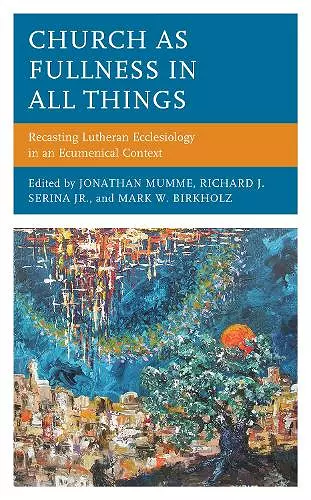Church as Fullness in All Things
Recasting Lutheran Ecclesiology in an Ecumenical Context
Mark W Birkholz editor Jonathan Mumme editor Richard J Serina, Jr editor
Format:Hardback
Publisher:Rowman & Littlefield
Published:25th Jun '19
Currently unavailable, and unfortunately no date known when it will be back

What is Lutheran ecclesiology? The Lutheran view of the church has been fraught with difficulties since the Reformation. Church as Fullness in All Things reengages the topic from a confessional Lutheran perspective. Lutheran theologians and clergy who are bound to the Holy Scriptures and the Lutheran Confessions explore the possibilities and pitfalls of the Lutheran tradition’s view of the church in the face of contemporary challenges. The contributors also take up questions about and challenges to thinking and living as the church in their tradition, while looking to other Christian voices for aid in what is finally a common Christian endeavor. The volume addresses three related types of questions faced in living and thinking as the church, with each standing as a field of tension marked by disharmonized—though perhaps not inherently opposite—poles: the individual and the communal, the personal and the institutional, and the particular and the universal. Asking whether de facto prioritizations of given poles or unexamined assumptions about their legitimacy impinge the church Lutherans seek, the volume closes with Anglican, Reformed, and Roman Catholic contributors stating what their ecclesiological traditions could learn from Lutheranism and vice-versa.
In the modern West, the church has become a contested idea too often co-opted into artificial schemes that privilege either adherence to institutions and propositions or the expression of personal faith and piety. Avoiding such facile polarities, the authors broaden our ecclesiological story by showing us constructive ways in which Lutheran thinking can account for the deeply interrelated individual and communal, personal and institutional, and particular and universal dimensions of the church. By bringing critical voices outside of Lutheranism into the conversation, the authors invite us to reflect on the challenge and promise of a Lutheran ecclesiology that is not merely centripetal but also centrifugal in its confessional and ecumenical potential. -- Leopoldo A. Sánchez M., Concordia Seminary
This collection of essays by Lutheran, Anglican, Reformed, and Roman Catholics seeks to encourage Christians in the pursuit of unity, communion, and community in the church. All who take ecclesiology seriously, whatever their Christian tradition, will find this collection of essays beneficial and profitable toward those ends. -- Glenn R. Kreider, Dallas Theological Seminary
This is an important book. The essays it comprises explore the intriguing premise that Lutheran ecclesiology lapses into distortion so long as it fails to reflect upon the nature of the church from within an ecumenical frame of reference. It follows from this vantage point that inter-confessional dialogue should not be viewed as merely a supplementary exercise, but rather as an integral moment within the pursuit of Lutheran ecclesial self-understanding. If this premise is correct—and I am convinced it is—then this book makes a very valuable contribution to contemporary discourse about the doctrine of the church. It will reward the attention of any reader who wishes carefully to consider what it means to confess and belong to the one, holy, catholic and apostolic church. -- David J. Luy, Trinity Evangelical Divinity School
Lutherans desire to know more about the church. They confess it in their creeds, and they find it in their congregations and among fellow believers confessing Christ. The church is manifest to them where the Word is preached and the Sacraments are distributed to God's people. But the church is also "hidden" in other traditions and denominations with a different history. In this volume thirteen scholars offer thoughts, convictions, and the results of research that guide the reader into ecclesiology from—and around—the Lutheran tradition, making this topic speak on biblical, confessional, and ecumenical levels today. Planting the fruits of Lutheran deliberations in a broader landscape of ecumenical estimations ensures that any reader interested in the church and its relationship to Lutheran theology will come away richer after reading. -- Jobst Schöne, Bishop Emeritus of the Independent Evangelical Lutheran Church (SELK, Germany)
ISBN: 9781978702851
Dimensions: 238mm x 159mm x 23mm
Weight: 603g
268 pages